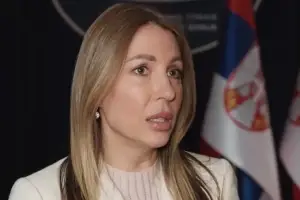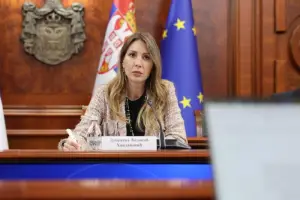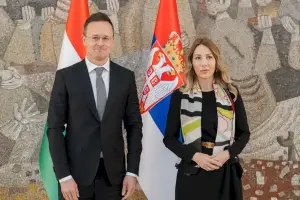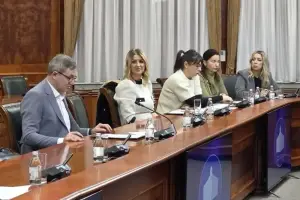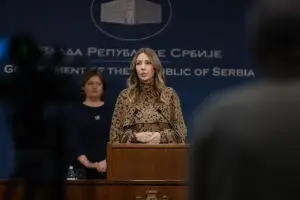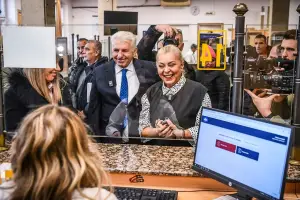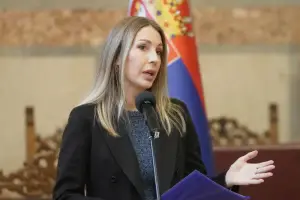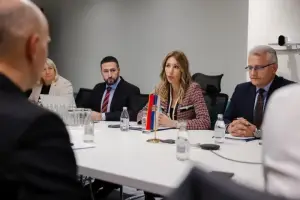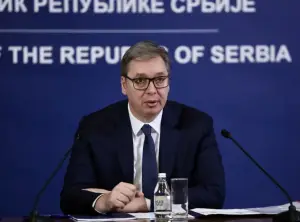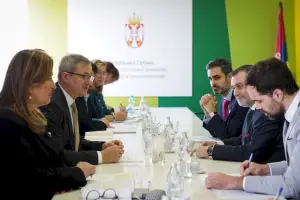Q:
A:
Serbia and Montenegro to hold separate talks with EU on Dec 20 and 21
Belgrade,
19 December 2005
Serbian Assistant Minister of International Economic Relations Dusko Lopandic said that the first round of technical talks on the stabilisation and association agreement with the EU, in which the teams of Serbia and Montenegro will negotiate separately, will be held on December 20 and 21 in Belgrade.
Lopandic told the Tanjug news agency that during November the negotiations were held on the general part of the agreement and that Serbia and Montenegro participated in these negotiations as a state union, while now the talks will concern the fourth chapter of the agreement, i.e. the free flow of goods.
In this stage, the negotiations enter "the two-track lane" such that apart from the formal participation of the state union, Serbia and Montenegro will hold separate talks on the creation of a free trade zone with the EU and the pace of liberalisation of trade with the EU.
He specified that the member states will hold separate talks on the liberalisation of industrial products, exchange of agricultural and food products, and fishery. He added that both the member states have received an identical draft agreement, but the lists of concessions are different for Serbia and Montenegro.
Lopandic said that Serbia's negotiating team has already determined the list of insensitive products, for which all customs duties and other restrictions will be removed immediately upon the conclusion of the agreement, as well as the category of sensitive and very sensitive products, for which a certain transitional period will be fixed until full liberalisation of import of these goods from the EU is allowed.
Speaking about the duration of these transitional periods, he said that they are related to the Serbian government's strategy envisaging a Serbia ready to enter the EU in 2013.
Speaking about industrial products, Lopandic said sections are in the process of liberalisation under the textile agreement and that we have an obligation to abolish all duties on the import of textile goods from the EU by 2008. According to him, there are many products for whose import the customs duties are 1% of zero, which have no protective effect and therefore these products will be the first to be subject to liberalisation.
Lopandic said that there are also sectors that are sensitive, owing to significant production, reconstruction of the sector, or high customs duties, such that a few years are still needed for liberalisation.
He explained that negotiations concerning agriculture are conducted differently, because in industry the ultimate goal is that customs duties are eliminated and it is just a question of time when that will happen, while in agriculture the aim is not complete liberalisation, rather concessions are given reciprocally for a limited number of products.
Lopandic said that agriculture is especially important for Serbia, because in trade with the EU it is only in exchange of food products that there is a surplus, so that it cannot liberalise too much and too fast the protection it has in the agriculture sector.
Lopandic said that Serbia’s specific position in these negotiations is that concerning liberalisation of trade Serbia cannot get more than it already has, because in 2001 the EU one-sidedly liberalised imports concerning the West Balkans, and it has been recently decided that these measures are to be extended for a period of five years.
He said that the EU has only a few exceptions to complete liberalisation of trade, which in regards to Serbia affects some industry in beef, cattle, some types of fish and wine, while in the industrial sector, the EU has no customs duties whatsoever, nor quantitative limitations towards Serbia’s exports.
The upcoming round of talks on industrial production negotiations for the EU will be headed by Directorate-General for Trade and Directorate-General for Agriculture, and as is the practice in these cases, also coordinated by representatives of the Enlargement Directorate-General.
In this stage, the negotiations enter "the two-track lane" such that apart from the formal participation of the state union, Serbia and Montenegro will hold separate talks on the creation of a free trade zone with the EU and the pace of liberalisation of trade with the EU.
He specified that the member states will hold separate talks on the liberalisation of industrial products, exchange of agricultural and food products, and fishery. He added that both the member states have received an identical draft agreement, but the lists of concessions are different for Serbia and Montenegro.
Lopandic said that Serbia's negotiating team has already determined the list of insensitive products, for which all customs duties and other restrictions will be removed immediately upon the conclusion of the agreement, as well as the category of sensitive and very sensitive products, for which a certain transitional period will be fixed until full liberalisation of import of these goods from the EU is allowed.
Speaking about the duration of these transitional periods, he said that they are related to the Serbian government's strategy envisaging a Serbia ready to enter the EU in 2013.
Speaking about industrial products, Lopandic said sections are in the process of liberalisation under the textile agreement and that we have an obligation to abolish all duties on the import of textile goods from the EU by 2008. According to him, there are many products for whose import the customs duties are 1% of zero, which have no protective effect and therefore these products will be the first to be subject to liberalisation.
Lopandic said that there are also sectors that are sensitive, owing to significant production, reconstruction of the sector, or high customs duties, such that a few years are still needed for liberalisation.
He explained that negotiations concerning agriculture are conducted differently, because in industry the ultimate goal is that customs duties are eliminated and it is just a question of time when that will happen, while in agriculture the aim is not complete liberalisation, rather concessions are given reciprocally for a limited number of products.
Lopandic said that agriculture is especially important for Serbia, because in trade with the EU it is only in exchange of food products that there is a surplus, so that it cannot liberalise too much and too fast the protection it has in the agriculture sector.
Lopandic said that Serbia’s specific position in these negotiations is that concerning liberalisation of trade Serbia cannot get more than it already has, because in 2001 the EU one-sidedly liberalised imports concerning the West Balkans, and it has been recently decided that these measures are to be extended for a period of five years.
He said that the EU has only a few exceptions to complete liberalisation of trade, which in regards to Serbia affects some industry in beef, cattle, some types of fish and wine, while in the industrial sector, the EU has no customs duties whatsoever, nor quantitative limitations towards Serbia’s exports.
The upcoming round of talks on industrial production negotiations for the EU will be headed by Directorate-General for Trade and Directorate-General for Agriculture, and as is the practice in these cases, also coordinated by representatives of the Enlargement Directorate-General.


